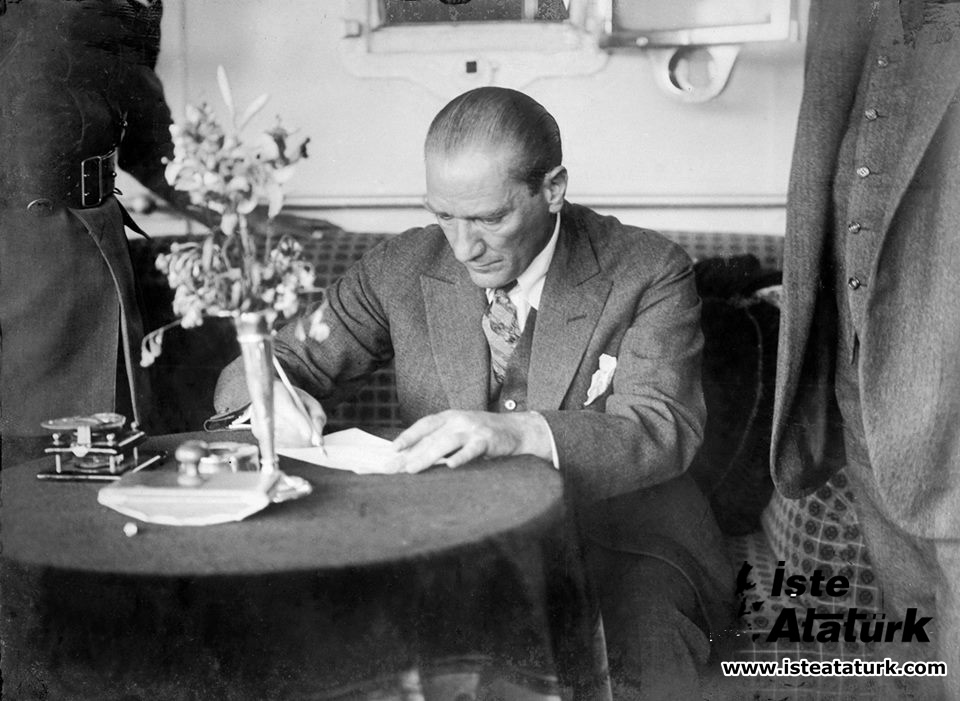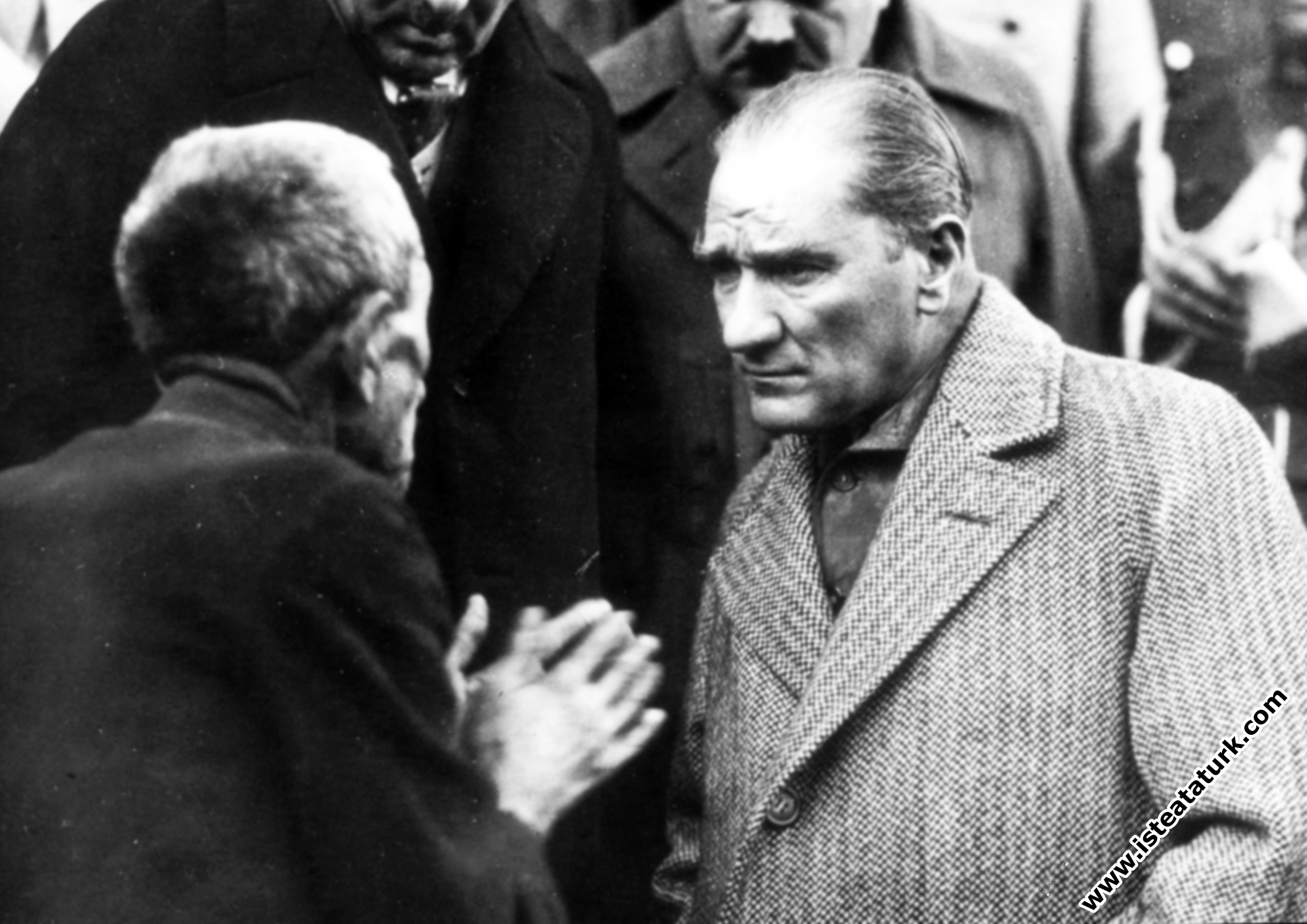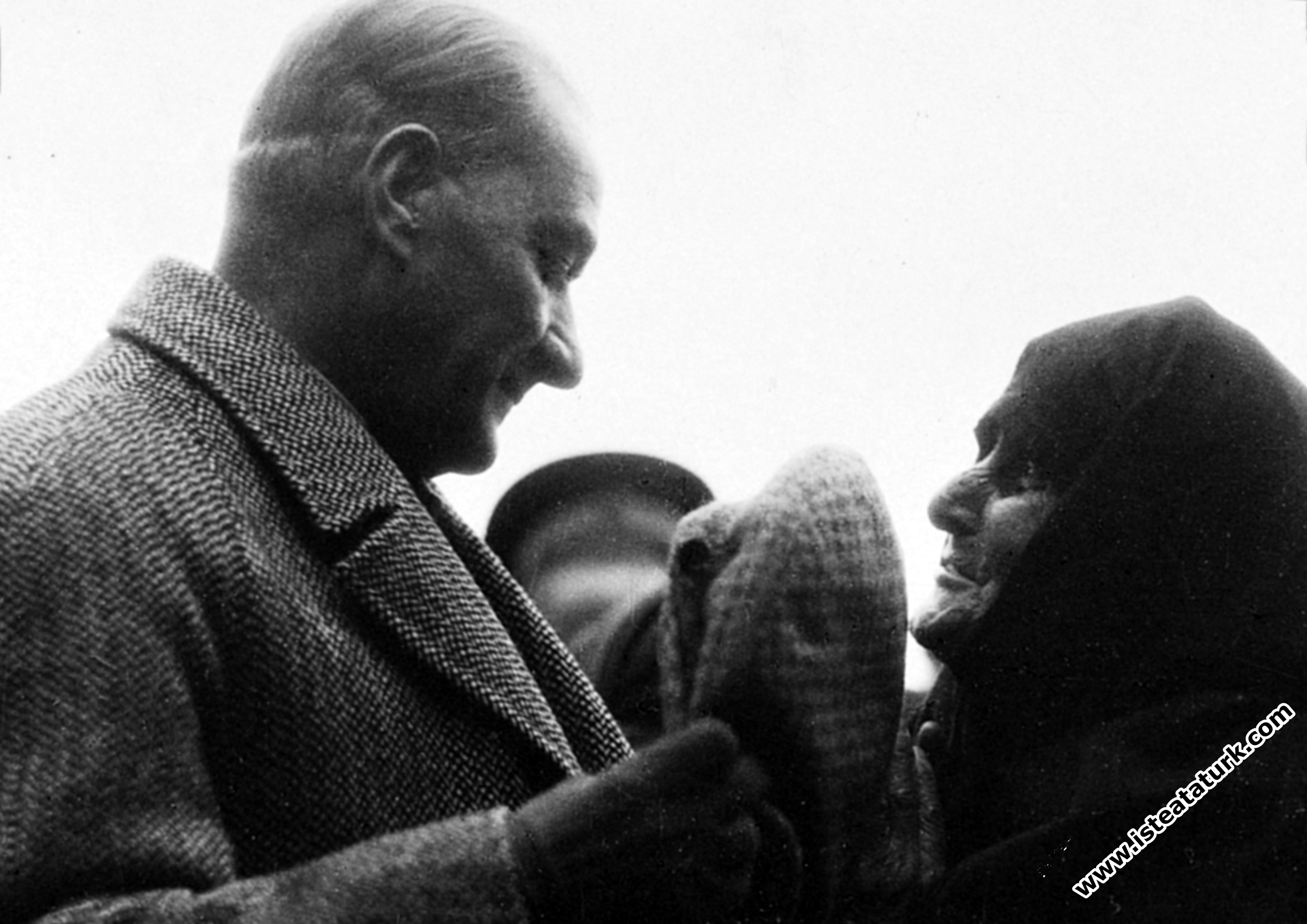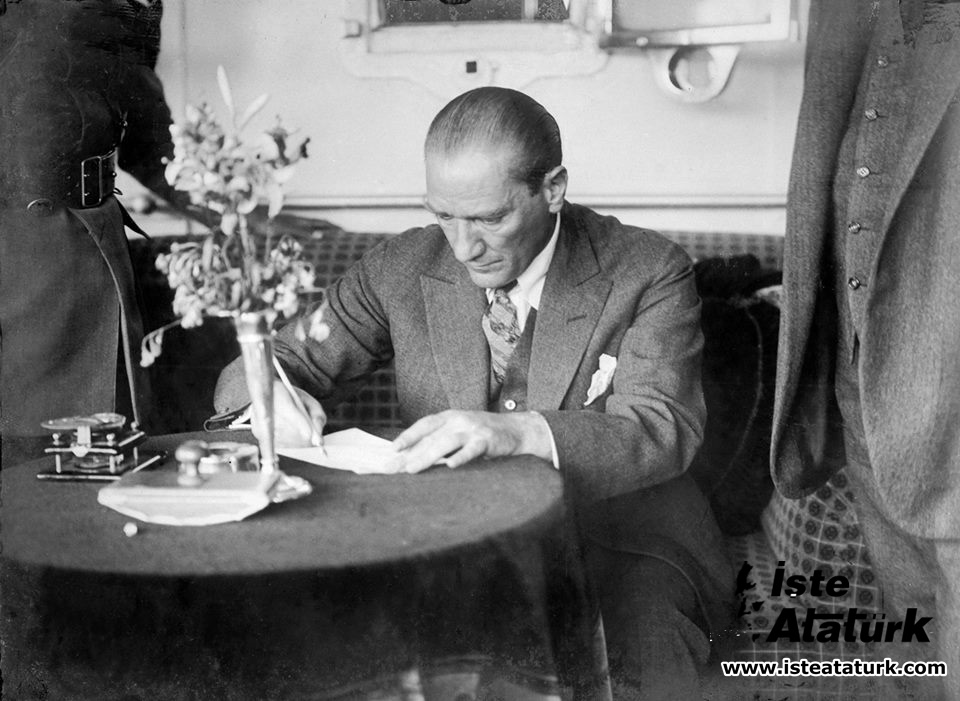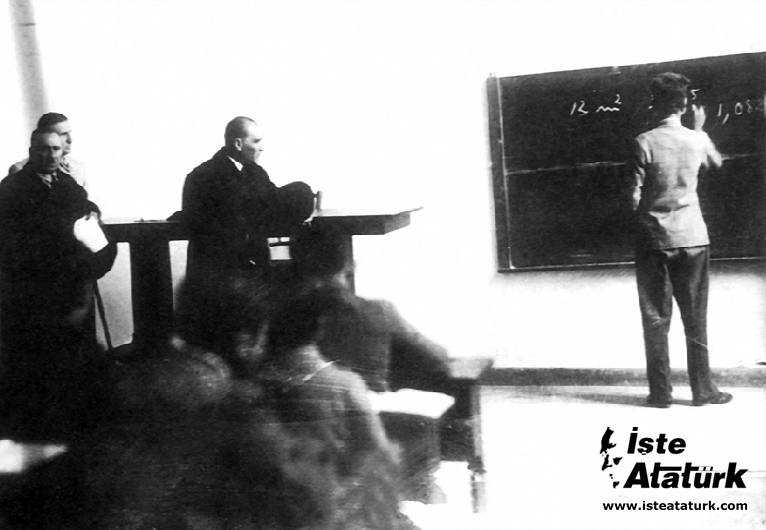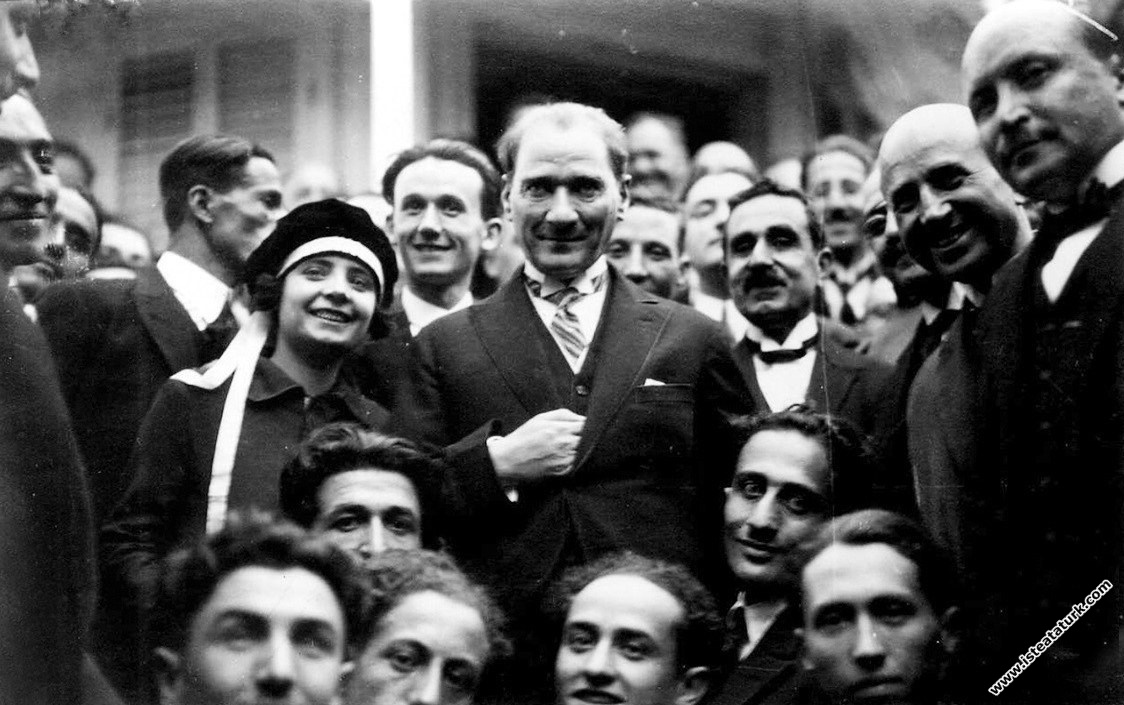
Atatürk's Concept of "Youth" and the Characteristics of The Atatürkist Youth
Character Size
Atatürk's Concept of "Youth" and the Characteristics of The Atatürkist Youth
Atatürk's Concept of "Youth" and the Characteristics of The Atatürkist Youth
One important factor which made Atatürk great is the importance he attached to the youth in our society. The idea of “youth” which the future of the country was most beautifully expressed by Atatürk, he gave the idea its highest meaning. The Great Man felt that the only way to fight against the ideas which had become outdated at the onset of the National Struggle and against those who whished to drag the nation backwards lay with the youth and the young ideas and with the new generations which would grow up with modern ideas; they would develop his work even more in the future and by protecting it from ali dangers would they make his work live on for ever. Therefore, after Atatürk had established the Turkish Republic and had successfuUy achieved the radical changes, he presented to the youth of Turkey May 19th, the day on which he set foot on Anatolian soil in Samsun, as the day of “The Festival of Youth and Sport”.
The concept of youth, when used in the biological sense, undoubt-edly refers to a certain age span. This period is generally a very valuable phase in which youth and the period of growing up are closely entwined. Atatürk also attached great importance to this period during which the youth reaches maturity and he insisted that the youth of Turkey should do well in their profession in a spirit which would make the Republic prosper. However, we should add that Atatürk’s concept of youth in the general sense comprises this biological period but also, from time to time surpasses the age limit and gains an ideological meaning, in other words it goes hand in hand with the renewing of ideas. The words of Atatürk : “Having young ideas means seeing and understanding the truth and having realistic ideas”, were used in this sense.
The Great Atatürk, who at the age of 42 proclaimed the Republic, at the age of 44 accomplished the radical change of headgear and costume and at 48 replaced the Arabic script with the new Turkish alphabet was young at every stage of his life because of the novelty of his ideas and the youthful energy of his soul. According to Atatürk the criterium. of being young was not only age but also believe in and dedication to the principles which had been laid down and the radical changes which had been accomplished. For this reason he himself said : “I mean by youth those who identify themselves with the ideas and ideology of the revolution and who carry these over to future generations. in my view, a twenty-year- old religious fanatic is old, a seventy-year old idealist, however, is an active youth”. Therefore in Atatürk’s address : “Oh, Youth of Turkey” we have to look for a youth of ideas, an ideal youth which surpasses age limits, this is the youth we have to see, we have to think of. Because according to Atatürk the established regime can only be entrusted to a youth which is dedicated to his principles and his radical changes.
The ideal of Atatürk was a youth which is dedicated to his principles, industrious and patriotic. “Young ones! Young ones, you who in the future will take on the realization of my ambitions! I am very pleased and fortunate because onc day I shall leave this country to a youth like you which has understood me.” Speaking thus he referred to the unshakeable faith he had in the youth of Turkey. Therefore our young people should understand the true meaning of the words of Atatürk and they should try to be what he wanted them to be: children worthy of him. Essentially he said: “Seeing me doesn’t necessarily mean seeing my face. it is enough if you feel and understand my ideas and emotions”. Therefore it is possible for the young people to know Atatürk, to really know him and to identify themselves with his ideas, thoughts and emotions.
Atatürk left us a realistic ideology which originated from the realities of the country and, without being carried away by dogmas, accepted the guidance of reason and science. We named this ideology Atatürkism and we should embrace it, as the youth of Turkey we should bring it from words to deeds. The Atatürkism he left to the youth is a sensible universal concept which was cleansed of every element of dogmatism. This realistic concept which opens the road to logic and reason to the young generations, and which will answer the needs of tomorrow as it does those of today, symbolizes a contemporary concept which always renews itself.
in the Atatürkist point of view, the principles and radical changes of Atatürk are the roads shown by reason and logic which will enable Turkey to reach the level of contemporary civilization in the shortest possible space of time. in this sense, the Atatürkism which is presented to the Turkish youth and which is always directed to-wards the right, the useful, and the future, is in constant progress and development in the race towards attaining the level of contemporary civilization. But this progress will not move away from its source, it will not lose this Atatürkist idea which gives this development direction, it will not waver from the Atatürkist point of view.
The young people should not forget that the Turkey of the Republic was founded on the concepts of Atatürk. The ideal of a prosperous and powerful Turkey was bound to the youth of Turkey which was shaped by the Atatürkist thought and which believed in the passing on of this concept from generation to generation. He himself said: “There are two Mustafa Kemals. One is me, the perishable Mustafa Kemal. The other is the ideal of Mustafa Kemal which lives inside the people”. The duty and responsibility of the youth of today lies in the realization of this ideal, to be bound to the Atatürkist way of thinking with an unshakeable believe, to claim complete ownership of the principles and radical changes advocated by Atatürk and to make them live on eternally. For the youth of Turkey this should be Atatürkism, this should be the true love for Atatürk.
According to Atatürk the youth should be brought up, possessing national consciousness and contemporary culture. it is particularly important that the youth possess a sound and positive charac-ter. According to Atatürk the youth, with the education and culture they are recieving, with their human virtue and patriotism, will be the most valuable of symbol the freedom of ideas. The young people shall be given a contemporary education, they shall be illuminated by the lights of positive science.
In Atatürkism ali the hope and the future of the nation are bound to the understanding and energy of the young people. it is therefore the youth which has to bring the Republic to higher levels and ensure its continuation it is for this reason that the duty of protecting the Turkish independence and the Turkish Republic for ever has been entrusted to them.
The youth which Atatürk described and longed for is not a youth which is split and divided and which keeps running after different ideals. On the contrary, it is a youth which represents the common tendencies of the Turkish people in their totality and which, apart from Atatürkism, is not captivated by any foreign trends or foreign ideologies whatsoever. That youth determines the future of the country and will fortify the foundations of the Turkish society of tomorrow even more. For this reason the Turkish youth should create a youth of ideas, a youth of believe, an youth of ideals.
Atatürk left the honour of fulfilling the sacred duty of bringing up the youth possessing these qualities and emotions especially to the teachers of the Republic. in this respect, the following words carry great value: “We have to bring the fields of science, culture, economics and public works in the country to higher levels, we have to develop the very positive abilities which our people possess in every respect and it is necessary to give the future generations a sound, unchanging and positive character. Amongst the intellectual forces which are fighting to reach these sacred goals, the teachers hold the most important and delicate position”.
The Great Man, again in the year 1937, while opening the Turkish Grand National Assembly, showed us the necessary roads towards reaching the levels of contemporary civilization. He insisted that foundations be created which would be kept alive from generation to generation and which would understand and explain the ideology of the basic principles of the country; he finished his words with the following sentence: “The first duty of our universities and schools for higher education is to keep the principles of which I spoke before, alive in the mind and consciousness of the youth of Turkey”.
We should never forget these words of Atatürk. For the sake of our own existence should we strive to fiercely defend and carry out his ideals. Our youth and every future generation should know that this sacred motherland, the Republic which was established in this motherland, was created through great şacrifice. We should not forget the fact that this great accomplishment, which today gives us room to breathe, has cost the lives of thousands of martyrs, thousands of ghazis. Within the bounderies drawn round this teritory by Atatürk and the Atatürkists, no trend whatsoever, which disagrees with their ideals should find the chance to bloom. The truth of the matter is that Atatürk planted the seeds which are to bloom on this soil, he left their growth and protection to us. Therefore he asked time and time again of the Turkish teachers who had been charged with the task of educating the young: “You are a teacher, a professor! I want you to continually inspire the young people with my ideals and continually strive to protect those ideals”. And he told Prof. Şemsettin Günaltay during one of their studies that these words should be accepted by every Turkish teacher -when educating the young- as the will and testament of Atatürk.
*Atatürk Kültür, Dil ve Tarih Yüksek Kurumu Eski Başkan Vekili ve Atatürk Araştırma Merkezi Eski Başkanı -
Prof. Dr. Utkan Kocatürk
Source: ATATÜRK ARAŞTIRMA MERKEZİ DERGİSİ, Sayı 7, Cilt: III, Kasım 1986
